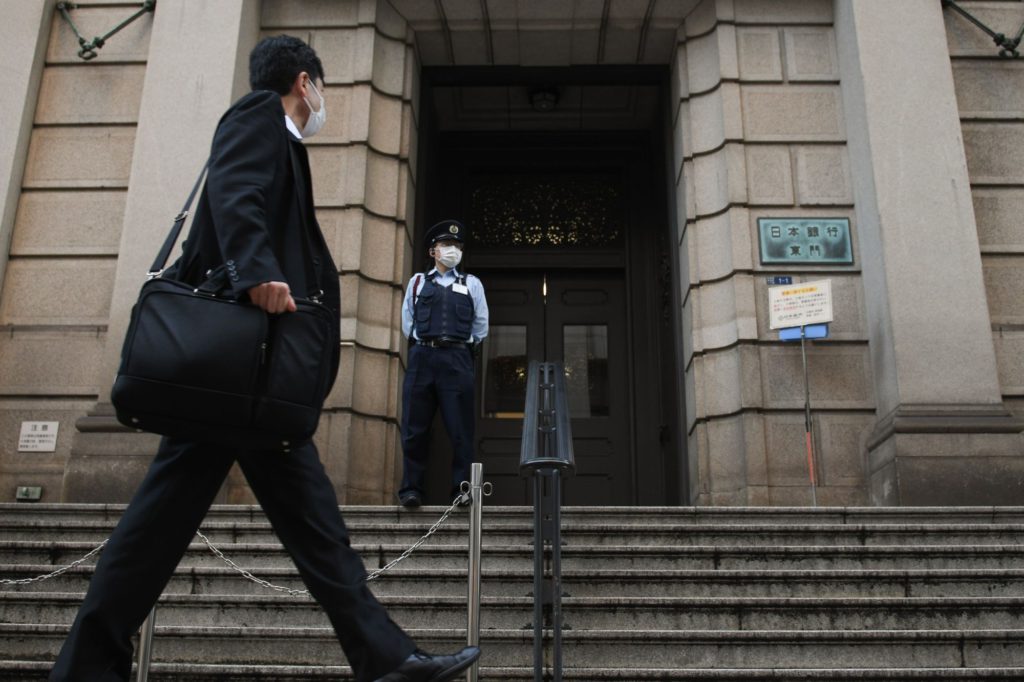The Bank of Japan is likely to allow bond yields to rise further following this week’s surprise move — part of a shift to a tighter monetary policy that will benefit financial firms, according to the chief executive of the nation’s second-biggest brokerage.
(Bloomberg) — The Bank of Japan is likely to allow bond yields to rise further following this week’s surprise move — part of a shift to a tighter monetary policy that will benefit financial firms, according to the chief executive of the nation’s second-biggest brokerage.
Daiwa Securities Group Inc. CEO Seiji Nakata called the central bank’s doubling of the cap on 10-year bond yields to 0.5% a “modest change in the direction” of its policy from a decade of aggressive easing. He expects the BOJ to increase the upper limit to 0.75% next year.
“The economic situation has clearly shifted away from deflation,” Nakata, 62, said in an interview.
Steering monetary policy through that change will be a task for the successor to BOJ Governor Haruhiko Kuroda, who steps down in April. The head of Daiwa’s research arm, Hiroshi Nakaso, is seen as a leading candidate.
Japan’s 40-year high inflation and signs of distortions in the bond market mean it’s a good time to start normalizing policy, Nakata said. Widening the yield band could prompt more investors to return to the market, stimulating trades and “opening more business opportunities for banks as well as intermediaries like us,” he said.
“The bond market has clearly been paralyzed, particularly in the 10-year zone,” Nakata said.
Yields at 0.75% should prompt institutional investors to buy 10-year Japanese government bonds without causing economic conditions to change dramatically, Nakata said. They shouldn’t get in the way of a recovery in the benchmark Nikkei 225 Stock Average, which could rise about 24% to 33,000 over the coming year, he said.
Nakata joins other BOJ watchers in interpreting this week’s move as a precursor to a policy shift. Goldman Sachs Group Inc. analysts said the next step may be to scrap negative interest rates. Shares of Japanese banks rallied this week on expectations that higher rates will boost profitability.
Swaps traders are already betting the BOJ will widen the yield cap to 0.75%. That’s even after Kuroda maintained that this week’s tweak didn’t constitute a step toward policy normalization, and said there are no plans to adjust the yield curve control program further for now.
Nakata said the timing of an expansion in the yield range depends on when signs of “demand-pull” inflation emerge in Japan, putting more upward pressure on market interest rates.
One impediment to sustained inflation in Japan is a lack of wage growth. For its part, Daiwa plans to raise pay, excluding bonuses, by an average 4% in the year starting April for its roughly 13,000 domestic employees, Nakata said.
Speaking about the potential successor to Kuroda, Nakata said picking a person with policy experience will offer a “sense of relief” to the market. He referred to Nakaso and Masayoshi Amamiya as examples of people who have been “at the center” of Japanese monetary policy making.
Nakaso, who is chairman of Daiwa Institute of Research, served as a BOJ deputy governor from 2013 to 2018 and in his younger years handled Japan’s late-1990s financial crisis. “He is a great person, a person of character,” Nakata said.
More stories like this are available on bloomberg.com
©2022 Bloomberg L.P.










